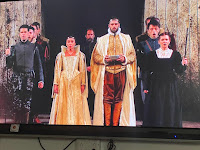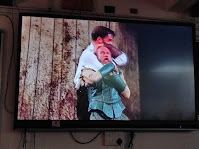Macbeth screening
This blog assigned by Dilip barad sir for thinking activity.
∆ Multiple-Choice Questions (MCQ's) :-
(1) What is the genre of Shakespeare's play "Macbeth"?
a) Comedy
b) Tragedy
c) Romance
d) History
(2) Which of the following best describes Macbeth's tragic flaw?
a) Ambition
b) Kindness
c) Honesty
d) Patience
(3) The witches' prophecies play a significant role in Macbeth's downfall. What is the primary theme associated with these prophecies?
a) Love
b) Power
c) Justice
d) Friendship
(4) Lady Macbeth's sleepwalking scene is a turning point in the play. What emotion is she struggling with during this scene?
a) Joy
b) Fear
c) Guilt
d) Anger
∆ Open - Ended Short Questions :-
(1.) Describe the symbolic significance of the opening scenes in Act I & IV involving the three witches in the play "Macbeth."
Ans.
In Act I of "Macbeth," the three witches set the tone of supernatural intrigue and foreshadow the chaos that will unfold. Their appearance in a desolate landscape and their chants create an eerie atmosphere, suggesting a world beyond the natural.
In Act IV, the witches' role as harbingers of Macbeth's downfall is solidified as they conjure apparitions and deliver cryptic prophecies, emphasizing the theme of fate vs. free will. The opening scenes with the witches symbolize the disruptive forces of the supernatural, the blurring of reality and illusion, and the moral ambiguity that will drive the tragic events of the play.(used Chat GPT)
(2.) How does Macbeth's ambition lead to his moral deterioration throughout the play? Provide examples from the play to support your answers.
Ans.
Macbeth's ambition is a central theme that drives his moral deterioration in the play. Initially, his ambition is ignited by the prophecy of becoming king, leading him to contemplate regicide. One example is when he murders King Duncan to fulfill the prophecy. This act marks a turning point as Macbeth's ambition overrides his morality.
Lady Macbeth also plays a role in fueling his ambition, pushing him to commit more atrocities. Her manipulation and persuasion drive Macbeth to kill Banquo and attempt to murder Banquo's son, Fleance, out of fear that they might threaten his reign.
As the play unfolds, Macbeth's ambition leads him to further immoral acts, such as hiring murderers to kill Banquo and his guilt-ridden descent into paranoia. He becomes obsessed with maintaining power and eliminates anyone he perceives as a threat. This culminates in the slaughter of Macduff's family, a heinous act that showcases the extent of his moral decay.
In summary, Macbeth's ambition, coupled with external influences, propels him towards a downward spiral of moral deterioration. His initial aspirations for greatness transform into ruthless actions driven by a desperate desire to maintain his position.(used Chat GPT)
(3.) In what ways does the motif of ‘blood’ serve as a symbol in "Macbeth"? Explain its significance in relation to guilt and violence. (‘Blood’ is mentioned around 40 times in the play)
Ans.
In "Macbeth," the motif of 'blood' symbolizes guilt and violence. Blood is initially associated with bravery and honor, but as the play progresses, it becomes a representation of the characters' growing guilt and descent into violence. Macbeth's guilt over Duncan's murder is vividly depicted through his hallucinations of bloody hands.
Lady Macbeth's obsession with washing her hands of imaginary blood reflects her guilt as well. The repeated mention of blood creates a link between the characters' actions and their consequences, highlighting the inescapable nature of guilt. This motif also underscores the theme of unchecked ambition, as Macbeth's thirst for power leads to a trail of bloodshed. Ultimately, the motif of blood serves as a visual reminder of the characters' moral deterioration and the spiraling violence driven by their ambitions.(used Chat GPT)
(4.) Discuss the impact of the supernatural elements, such as the witches and prophecies, on the plot and characters of "Macbeth."
Ans.
The supernatural elements in "Macbeth," including the witches and prophecies, play a crucial role in shaping the plot and characters. The witches' prophecies instigate Macbeth's ambition and desire for power, leading him to commit regicide. The prophecies also manipulate Macbeth's sense of invincibility, ultimately leading to his downfall.
Lady Macbeth's obsession with the supernatural prophecies contributes to her own descent into madness. The presence of the supernatural adds an atmosphere of darkness and uncertainty, highlighting the theme of fate versus free will as characters grapple with their destinies.(used Chat GPT)
(5.) Compare and contrast the characters of Macbeth and Lady Macbeth. How do their personalities and motivations contribute to the unfolding of the tragedy?
Ans.
Macbeth and Lady Macbeth are central characters in Shakespeare's play "Macbeth." Their personalities and motivations differ significantly, driving the unfolding tragedy in distinct ways.
Macbeth starts as a loyal and brave soldier, but his ambition is ignited by the witches' prophecies. He is plagued by inner conflicts, torn between his desire for power and his moral conscience. Lady Macbeth, on the other hand, is initially ambitious and determined, urging Macbeth to seize power. She is strong-willed and manipulative, willing to do whatever it takes to achieve her goals.
Lady Macbeth's influence on Macbeth is pivotal. She challenges his masculinity and pushes him to commit murder. Macbeth's ambition and Lady Macbeth's manipulation feed off each other, spiraling them deeper into darkness.
Macbeth's internal struggle and Lady Macbeth's ambition drive them to commit heinous acts, resulting in a cycle of bloodshed and destruction. The contrast between their initial characteristics and their eventual moral decay serves as a cautionary tale about the corrupting nature of unchecked ambition and the consequences of disregarding one's moral compass.(used Chat GPT)
• Reference:-
• used Chat GPT
• photos : Macbeth screening photo
Thank you for visiting 😊








.jpeg)

